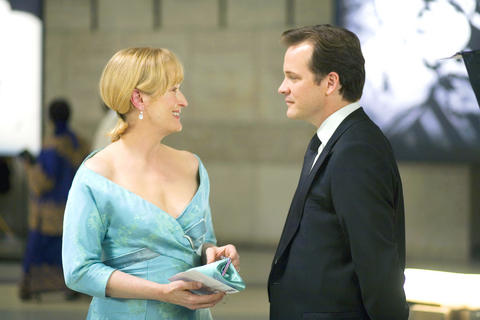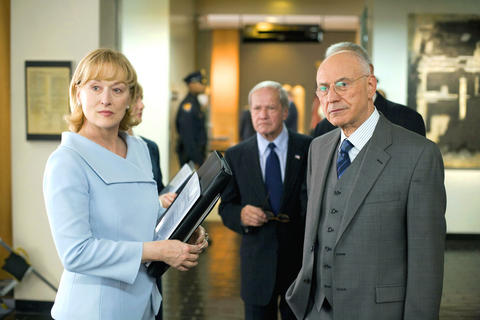Given the tenor of political discussion these days, it is inevitable that someone with a loud voice and a small mind will label Rendition anti-American. (But look! A quick Internet search reveals that some people already have, many of them without even bothering to see the movie.) It is, after all, much easier to rant and rave about treacherous Hollywood liberals than to think through the moral and strategic questions raised by some of the policies of the US government. But it is just these questions that Rendition tries to address, in a manner that, while hardly neutral - it may not shock you to learn that the filmmakers come out against torture, kidnapping and other abuses - nonetheless tries to be evenhanded and thoughtful.
Everyone in the movie, that is, receives a sympathetic hearing. The North African police chief who supervises the beating and water-boarding of an innocent prisoner, the American intelligence official who puts the prisoner into the torturer's hands, the senator who hesitates to intervene. They may be villains, but they see their actions as justified, something they have in common with the conscience-stricken CIA analyst and the reluctant jihadist who are their adversaries.
Rendition may be earnest, but it is hardly naive. Rather, it tries to be thoughtful and respectful of complexity while at the same time honoring the imperatives of commercial entertainment. It has timely issues and serious ambitions, and it also has movie stars - Reese Witherspoon with a huge pregnant belly, Meryl Streep with a Southern accent, Jake Gyllenhaal with sad, sleepy eyes - as well as young romance, breathless chases and violent explosions. Honestly, what could be more American than that? (Now might be the time to note that the director, Gavin Hood, is from South Africa. His last film, Tsotsi, won the Oscar in 2006 for best foreign-language film. The screenwriter here is Kelley Sane.)

PHOTO: COURTESY OF VIE VISION PICTURES
So Rendition is a well-meaning, honorable movie. Which is not to say that it is a very good one. It suffers especially from a familiar kind of narrative overcrowding. Sane and Hood frantically weave together plot strands in an effort to visit as many ideological, religious and emotional battlegrounds as they can, and the result is a degree of combat fatigue, as well as information overload. The filmmakers obey the current rule in Hollywood that states that a picture with large themes and a one-word title must also have multiple, chronologically de-centered story lines. (For your consideration: Crash, Syriana and Babel.) But they don't handle the complications very well, and try to pull off a third-act surprise that is less a plot twist than a logical unraveling. You may spend the last 15 minutes rubbing your eyes and scratching your head in puzzlement rather than fighting back tears.
But up until that point, each story, taken on its own, yields some touching moments and canny insights. At the center of the hubbub is Anwar El-Ibrahimi (Omar Metwally, who stole a scene in Munich), an Egyptian-born engineer who has lived in the US for his entire adult life. On his way home to Chicago from Cape Town, Anwar is snatched at the airport in Washington and "rendered" into the brutal penal system of an unspecified North African country where a suicide bombing has recently killed, among others, a CIA operative. Back home Anwar's American wife, Isabella (Witherspoon), unable to find out what has happened to him, tries to work her only government connection, an old boyfriend, Alan Smith (Peter Sarsgaard), who now works on the staff of one Senator Hawkins (Alan Arkin).
Meanwhile, back in North Africa, the police chief, Abasi Fawal (Igal Naor), when he isn't torturing Anwar in a dank, shadowy dungeon, is worrying about his oldest daughter, Fatima (Zineb Oukach). She has been hanging around with Khalid (Moa Khouas), a poor, soulful artist with a sad smile, a motorbike and connections to the terrorists. And Douglas Freeman (Gyllenhaal), a CIA analyst whose Bogart- (or perhaps Clooney-) esque dissolution was interrupted by the bombing, begins to have second thoughts about what Fawal is doing.

PHOTO: COURTESY OF VIE VISION PICTURES
Freeman and Fawal conduct an argument about ends and means that is mirrored by the debate between Smith and Corrinne Whitman (Streep), who runs the rendition program with unflappable conviction. The tussle in Washington is more pointed and emphatic - "Americans don't torture," Streep hisses, while Sarsgaard hisses back about due process and the rule of law - but the one in North Africa has a more pungent atmosphere and juicier acting.
Naor, with his shiny head and bushy eyebrows, is as emphatic in his gestures and expressions as an actor in a silent movie, with a gruff, rolling baritone that makes you glad that Rendition isn't one. Gyllenhaal, for his part, tries his hand at minimalism, conveying his character's ethical quandary by moping and mumbling. The two of them are an oddly captivating team.
For her part, Witherspoon retains her stunned, steely resolve until the script calls upon her to start screaming, while Streep savors another chance to embody the chilly self-confidence of power. Oukach and Khouas, as the young, star-crossed lovers, have little to do but regard each other with wounded, wide-eyed longing; this is not a movie with much need for ingenues.

PHOTO: COURTESY OF VIE VISION PICTURES
And yes, it could have used more subtlety, a lighter touch, a more disciplined narrative. But all its clumsy efforts are toward an honest and difficult goal, which is to use the resources of mainstream moviemaking to get viewers thinking about a moral crisis that many of us would prefer to ignore. Of course it's disappointing when such efforts don't succeed, but I wouldn't want to live in a country where filmmakers never tried.

May 18 to May 24 Pastor Yang Hsu’s (楊煦) congregation was shocked upon seeing the land he chose to build his orphanage. It was surrounded by mountains on three sides, and the only way to access it was to cross a river by foot. The soil was poor due to runoff, and large rocks strewn across the plot prevented much from growing. In addition, there was no running water or electricity. But it was all Yang could afford. He and his Indigenous Atayal wife Lin Feng-ying (林鳳英) had already been caring for 24 orphans in their home, and they were in

On May 2, Chinese Nationalist Party (KMT) Chairman Eric Chu (朱立倫), at a meeting in support of Taipei city councilors at party headquarters, compared President William Lai (賴清德) to Hitler. Chu claimed that unlike any other democracy worldwide in history, no other leader was rooting out opposing parties like Lai and the Democratic Progressive Party (DPP). That his statements are wildly inaccurate was not the point. It was a rallying cry, not a history lesson. This was intentional to provoke the international diplomatic community into a response, which was promptly provided. Both the German and Israeli offices issued statements on Facebook

Even by the standards of Ukraine’s International Legion, which comprises volunteers from over 55 countries, Han has an unusual backstory. Born in Taichung, he grew up in Costa Rica — then one of Taiwan’s diplomatic allies — where a relative worked for the embassy. After attending an American international high school in San Jose, Costa Rica’s capital, Han — who prefers to use only his given name for OPSEC (operations security) reasons — moved to the US in his teens. He attended Penn State University before returning to Taiwan to work in the semiconductor industry in Kaohsiung, where he

President William Lai (賴清德) yesterday delivered an address marking the first anniversary of his presidency. In the speech, Lai affirmed Taiwan’s global role in technology, trade and security. He announced economic and national security initiatives, and emphasized democratic values and cross-party cooperation. The following is the full text of his speech: Yesterday, outside of Beida Elementary School in New Taipei City’s Sanxia District (三峽), there was a major traffic accident that, sadly, claimed several lives and resulted in multiple injuries. The Executive Yuan immediately formed a task force, and last night I personally visited the victims in hospital. Central government agencies and the